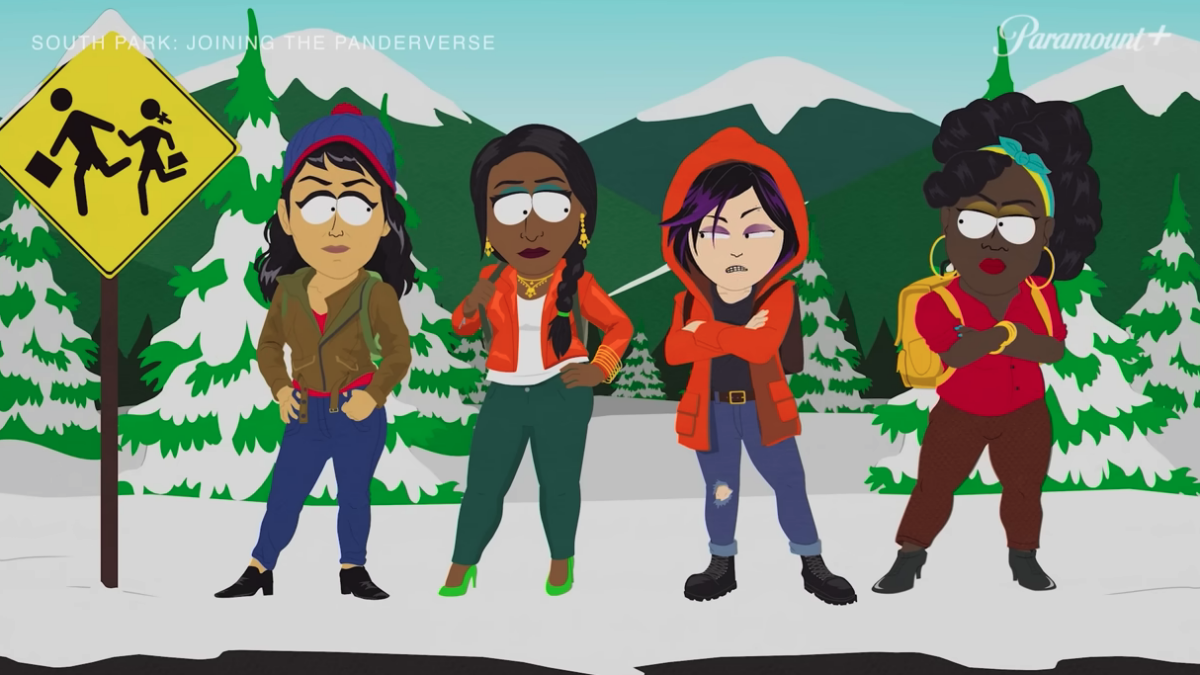Finally, “South Park” creators Matt Stone and Tray Parker are addressing the pervasive problem of wokeness in entertainment. In the show’s recent episode “South Park: Joining the Panderverse,” one of the main characters, Eric Cartman, is transported to an alternate “diverse” universe where every character in the show is now a “woman of color.” The whole story perfectly illustrates just how lazy and irritating it is to race- and sex-swap characters and rely on narrative contrivances like the multiverse to make it all connect.
Although the episode is characteristically unsubtle and crude (loads of repeated jokes and profanity), the argument it makes is surprisingly balanced. Yes, today’s popular entertainment has gone off the deep end with the wokeness, but there’s something to be said about the critics and fans who take their resentment too far.
While it’s healthy and normal to take issue with obvious woke signaling intended to pander to a leftist audience (as represented by Cartman’s friends), this can slip into a paranoid obsession for those fans who feel deeply betrayed and hurt by wokeness (as represented by Cartman who has nightmares about the Disney executive Kathleen Kennedy).
Furthermore, the episode makes the important point that diversity in itself is not a bad thing. Well-crafted plots and characters work with diverse and non-diverse characters alike — one character mentions Miles Morales from “Spiderman: Into the Spiderverse” as an example of this. This only degenerates into pandering when poorly developed yet diverse characters are shoehorned into an idiotic storyline, as it’s self-consciously demonstrated in “South Park: Joining the Panderverse.”
Of course, there’s a reason the episode specifically targets Disney, which has spent the last decade burning through its beloved franchises and is now out of material. The company has been addicted to producing sequels, reboots, spinoffs, and every other possible derivative. This was taken up a notch when it launched its streaming channel, Disney Plus. And it all went well … until it didn’t.
Once popular IPs such as Star Wars, the Marvel Cinematic Universe, and even the Disney princesses are now routinely derided upon arrival and collectively ignored. Already, “The Marvels,” one of the most expensive Marvel movies ever made, is set for a terrible opening weekend, and the live-action “Snow White” has been delayed for a year for the bad press it has received.
Discussing these developments has launched more than a few successful YouTube channels — my personal favorite is “The Critical Drinker.” Besides lamenting the dearth of creativity and imagination in Disney, these YouTubers will assert that most of its woes can be attributed to its commitment to wokeness.
Instead of prioritizing a good story and relatable characters, as it used to do, filmmakers at Disney now aggressively push diverse characters and leftist narratives above all else. As a rule, its protagonists will always be women, LGBT, or nonwhite people (or all three); its antagonists will usually be straight, white males; and the plot will usually involve casting aside old characters to clear the way for the new girlboss (see: Star Wars, Indiana Jones, phases four and five of the MCU, and the live-action “Little Mermaid”).
Of course, anyone who happens to notice this will be labeled a “racist sexist bigot” by the cultural gatekeepers, which then emboldens Disney and others to create ever more lousy woke content. And just as “there is a great deal of ruin in a nation,” there is a great deal of ruin in entertainment behemoths like Disney, which means that fans will be subjected to so much more of this garbage in the years to come.
As the episode’s hopeful resolution suggests, the fact that it’s possible to have a diverse cast without being woke makes it relatively easy for companies like Disney to return to a place of sanity and stop alienating their fans. Instead of doubling down on what they’re currently doing (presumably as a response to criticism and hate mail from obsessed fans), they can start creating quality programming again that allows diverse characters to be actual characters, not tokens.
Will this make everyone happy? No, there will always be loud voices on the fringes — usually those who spend way too much time online — accusing each new movie and TV show of being insufficiently woke or too woke. Yet, as vocal as these critics are, filmmakers and writers need to cater to the majority who simply want to lose themselves in a good story. This was the case for Disney not so long ago, and it can be the case once again.
Despite the company’s best efforts, most fans still want Disney to succeed. Hopefully, its leaders can take “South Park’s” joke (and advice), learn from their failures, and do better.









